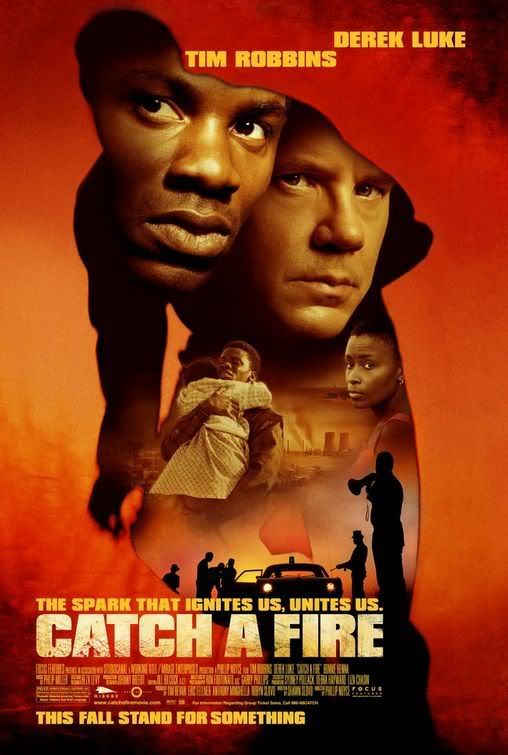Catch a Fire
 Catch a Fire ***
Catch a Fire ***"Catch a Fire" is an hour of compelling and harrowing drama scenes, great acting, and a thoughtful story. And then its last forty minutes turns into a standard thriller, not offering anything new to the genre. It begins with the introduction to Patrick Chamusso, a hardworking family man, who cares about two things in life more than anything: his family and football. Patrick minds his own business, and does not get involved in things that are way over his head. However, he is about to get thrown right into the middle of everything that he is trying to avoid, when South African revolutionaries attack the oil refinery that he works in. Patrick may be a good man, but he still made plenty of mistakes in the past. And one of those includes his affair with another woman, and the pregnancy that followed. Patrick visits this son, but never tells his wife about it. This is where Patrick was on the night of the explosion, and he refuses to tell the police where he was when it happened. This puts him in hot water with Nic Vos, the anti-terrorist chief in the area. Nic arrests Patrick, and at first believes that he was involved with the attack. He locks him up and tortures him, and then when Patrick still refuses to talk, he kidnaps his wife and begins to treat her badly too. Patrick talks and Nic lets him go, but that doesn’t make gone the fact that Vos treated Patrick’s wife the way he did. Patrick decides to join the ANC, the African National Congress, and joins the revolution that he was just accused of being in. He becomes what he was trying to prove himself not a part of. And then it becomes a chase, where Patrick tries to destroy the refinery, and Nic tries to go and stop him.
Patrick and Nic are really both very similar people. They are hardworking family people, who have made their fair share of mistakes, but are just trying to do their jobs. While Patrick is off playing football with the neighborhood children, Nic is in the park with his family singing songs on his guitar(and one a side note, Tim Robbins is certainly not the best singer in the world.) And yet, they are both the polar opposites of one another. The two leads, Robbins and Derek Luke, are fantastic in their roles, and work well off one another. It plays with your emotions, as you never know who to root for. In one section. Nic seems like the villain. You see what he is doing to Patrick and his family, but it is really just his job. And then we have Patrick doing what he can to destroy the refinery. But is what he is doing right? Is it morally correct to resort of terrorism even though you just tried to prove yourself innocent?
Director Phillip Noyce is clever in using actual events from the past and making them relate to the world we live in today. The revolution and the work of the ANC is long done with, but the ethical standard that it questions is perfectly relevant to the world today, and the situation around the world, especially in Iraq. Unfortunately, the second half becomes a simple paint by numbers type of story, not really anything special or worthy. It stops posing questions, and just tries to thrill you. But it is still something to scope out and look for. It is an interesting film, and a very good one. It isn’t something that will end up being on any best of lists, or at any award ceremonies, but I liked it a lot.

0 Comments:
Post a Comment
Subscribe to Post Comments [Atom]
<< Home